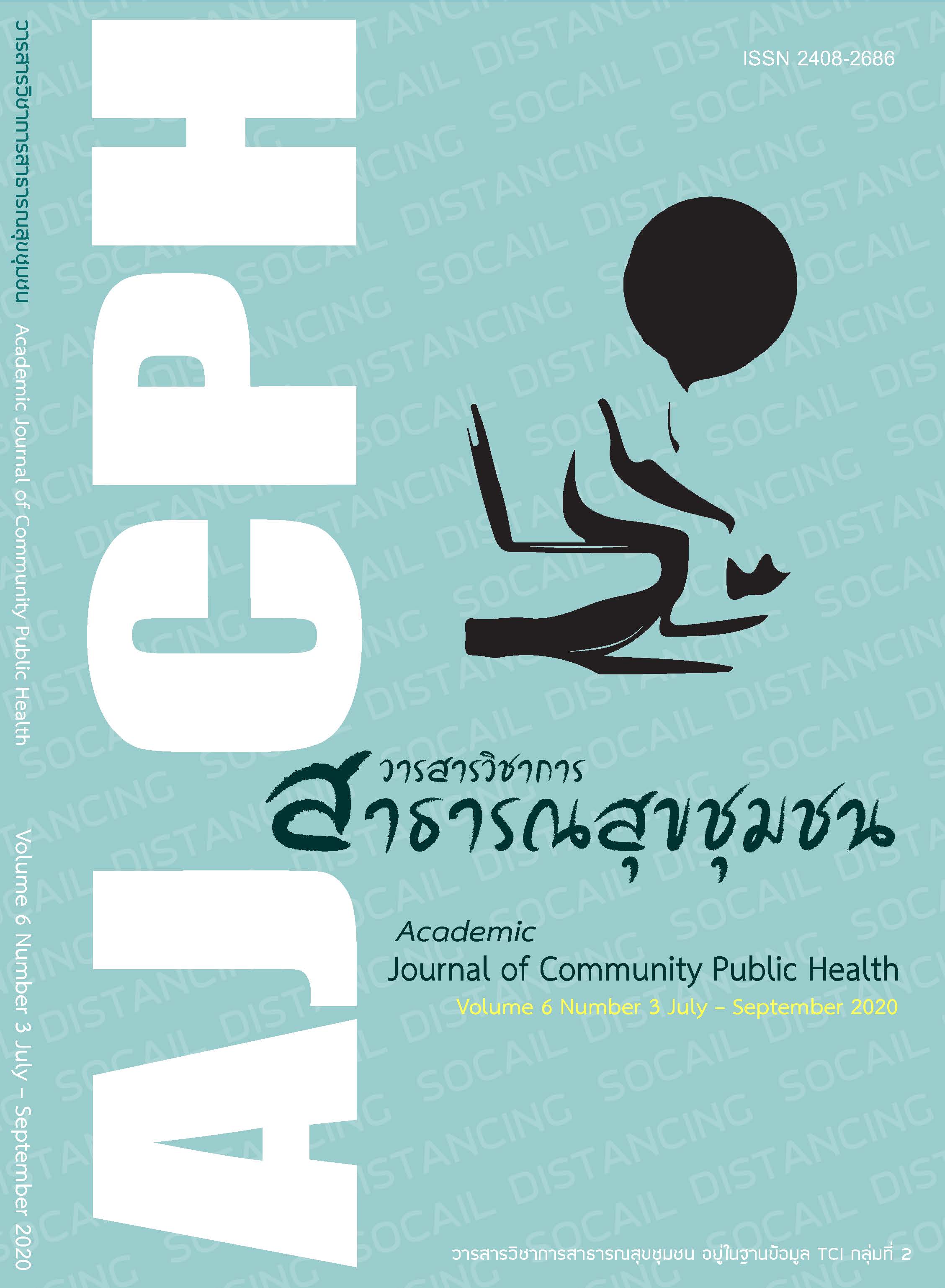การพัฒนาและประเมินผลรูปแบบการส่งเสริมสุขภาพสำหรับผู้สูงอายุที่เป็นโรคเบาหวานและโรคความดันโลหิตสูงโดยการมีส่วนร่วม ในพื้นที่ตำบลคลองข่อย อำเภอปากเกร็ด จังหวัดนนทบุรี
คำสำคัญ:
ผู้สูงอายุ, โรคเบาหวาน, โรคความดันโลหิตสูง, การสร้างเสริมสุขภาพ, การมีส่วนร่วมบทคัดย่อ
การวิจัยนี้มีวัตถุประสงค์เพื่อพัฒนารูปแบบการส่งเสริมสุขภาพสำหรับผู้สูงอายุที่เป็นโรคเบาหวานและโรคความดันโลหิตสูงโดยการมีส่วนร่วม และประเมินผลการใช้รูปแบบการส่งเสริมสุขภาพดังกล่าว วิธีการศึกษามี 2 ระยะ ระยะแรก ใช้การสนทนากลุ่มผู้มีส่วนได้ส่วนเสียในชุมชน 18 คน เพื่อกำหนดรูปแบบการส่งเสริมสุขภาพสำหรับผู้สูงอายุที่เป็นโรคเบาหวานและโรคความดันโลหิตสูง ระยะที่สอง เป็นเชิงกึ่งทดลอง เพื่อประเมินผลการใช้รูปแบบฯ นาน 3 เดือน กับผู้สูงอายุเป้าหมาย 52 คน วัดความเชื่อในความสามารถ พฤติกรรมการดูแลสุขภาพ ผลลัพธ์ด้านสุขภาพ และสนทนากลุ่มเพื่อถอดบทเรียน ใช้สถิติเชิงพรรณนา paired samples t-test และการวิเคราะห์เชิงเนื้อหา ผลการวิจัยระยะแรกได้รูปแบบการส่งเสริมสุขภาพฯ ที่ใช้การอบรม 2 วัน เน้นการเรียนรู้แบบมีส่วนร่วมเพื่อเสริมพลัง และติดตามอีก 2 ครั้ง การประเมินผลการดำเนินการตามรูปแบบการส่งเสริมสุขภาพในระยะที่สอง พบว่าผู้สูงอายุมีความเชื่อในความสามารถ พฤติกรรมการดูแลสุขภาพ และน้ำตาลในเลือดดีขึ้น อย่างมีนัยสำคัญทางสถิติ p-value < 0.001 ส่วนดัชนีมวลกายและความดันโลหิตไม่แตกต่างกันทางสถิติ การถอดบทเรียนพบว่าชุมชนได้เรียนรู้การบูรณาการในการทำงาน กระบวนการดึงศักยภาพบุคคลจากกิจกรรมหรือเกมการเรียนรู้ที่น่าสนใจและสนุกสนาน รวมถึงการนำรูปแบบไปต่อยอด
เอกสารอ้างอิง
2. Foundation of Thai gerontology research and development institute. Thai elderly situation 2016. Prasatkul, P. (ed). Nakon Pathom: Printery; 2017.
3. National health security office. Management system of health security funds at the local or regional level. Retrieved June 22, 2019, from http://obt.nhso.go.th/obt/about?id=3.
4. Ministry of public health. Health resources system of primary care unit. 2018. Retrieved August 15, 2018, from http://gishealth.moph.go.th/pcu/index.php.
5. Khlong Khoi sub-district administration organization. Preliminary survey results among diabetes and hypertension elderly patients in Khlong Khoi sub-district, document for stakeholders meeting on Feb 21, 2017. Khlong Khoi sub-district administration organization; 2017.
6. Pender NJ, Murdaugh GL, Parsons MA. Health promotion in nursing practice. 5th ed. New Jersey: Parson Education, Inc.; 2006.
7. Office of Thai health strategy, Non-communicable diseases network plan. Document for meeting of policy and direction for non-communicable diseases and policy proposals from non-communicable diseases research on December 19, 2016. Richmond Stylish Convention Hotel, Nonthaburi province; 2016.
8. Pensirinapa N. Community participation development in community public health work, in Community public health work. 3th ed. Nonthaburi: School of health science, Sukhothai Thammathirat Open University; 2019.
9. Pensirinapa N. Empowerment for cardiovascular diseases risk behavior modification, Theory and practice. 5th ed. Bangkok: Charan Sanitwong Printing; 2019.
10. Powers MA, Bardsley J, Cypress M, Duker P, Funnell MM, Fischl AH, Maryniuk MD, Siminerio L, Vivian E. Diabetes self-management education and support in type 2 diabetes: A joint position statement of the American Diabetes Association, the American Association of Diabetes Educators, and the Academy of Nutrition and Dietetics. Clinical Diabetes. 2016; 34(2): 70–80.
11. Rodjarkpai R, Kittilernkrait S, Kamonpornmongkol P. Effect of empowering program for self-protection behavior in people at risk of diabetes Nong Yai district, Chonburi province. The Public Health Journal of Burapha University. 2012; 7(2):117-132.
12. Suwankruhasn N, Pothiban L, Panuthai S, Boonchuang P. Effects of a self-management support program for Thai people diagnosed with metabolic syndrome. The Pacific Rim International Journal of Nursing Research, 2013; 17(4), 371-383.
13. Tussanawin U, Harnirattisai T, Pinyopasakul W. The Effects of Diabetic Day Camp Participation on Perceived Self-efficacy, Self-care Behaviors and Blood Sugar Level among Patients with Diabetes Mellitus, Type 2. Thai Journal of Nursing Council. 2010; 25(1): 53-66.
14. Niltanon D, Sota C. Health promotion for diabetes patients type 2 using enhancement of self-efficacy, group processes and social support - a study undertaken at the Erawan Hospital, Amphur Erawan, Loei Province. KKU Research Journal (Graduate Studies). 2010; 10(3): 51-60.
15. Pena-Purcell NC, Bggess MM, Jimenez N. An empowerment-based diabetes self-management education program for Hispanic/Latinos: a quasi-experimental pilot study. The Diabetes Educator. 2011; 37(6): 770-9.
16. Anuruang S. Community-based intervention to improve hypertension management in Thailand. Dissertation of Doctor of Philosophy. (Doctoral Dessertation), Sydney: University of Technology Sydney; 2015.
17. Ngowsiri K, Karuhadej P, Napapongsa K. Effectiveness of Thai mind-body exercise “Rusie Dutton” on blood pressure and quality of life in older adults in Bangkok. Thailand Journal of Public Health and Development. 2018; 16(3): 41-53.
18. Schinckus L, Van den Broucke S, Housiaux M, Diabetes Literacy Consortium. Assessment of implementation fidelity in diabetes self-management education programs: a systematic review. Patient Education and Counseling. 2014; 96(1):13-21.



